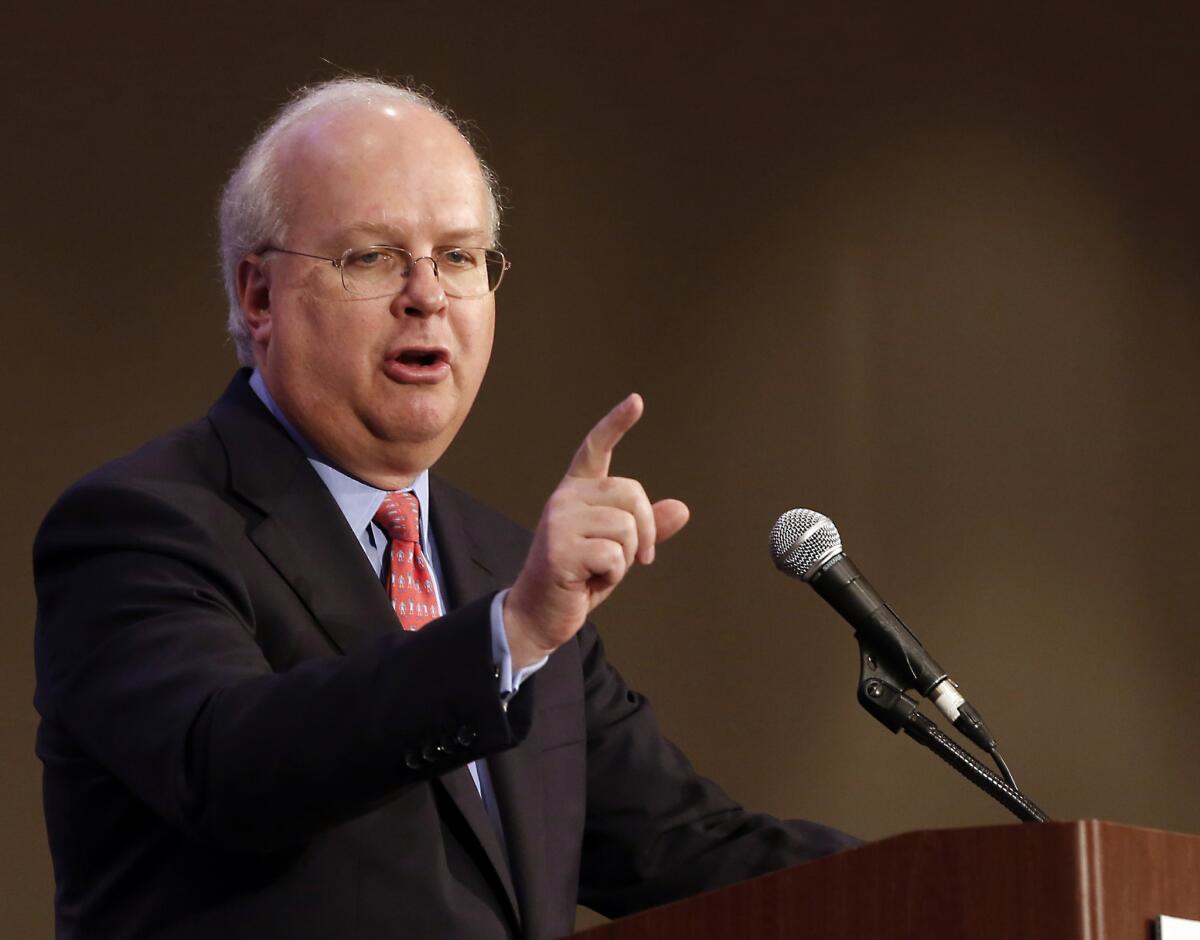The Rove rule: When all else fails, make ‘Obamacare’ a dirty word

- Share via
The disconnect between what Americans think of most provisions of Obamacare (love them!) and what they think of “Obamacare” (hate it!) has been the most perplexing aspect of rollout of the Affordable Care Act.
It’s also the aspect most vigorously exploited by Republican opponents of the law. That’s not so perplexing, since it’s hornbook politics that if you don’t have anything substantive to say about an issue, just demonize it.
Greg Sargent points us to the latest example of this technique in action. The perpetrator (big shock) is Karl Rove, whose Crossroads GPS has launched an ad campaign attacking Sen. Mark Pryor, D-Ark., for supporting Obamacare.
The joke is that Pryor had already gone live with ads touting his support of Obamacare--without calling it “Obamacare.” He simply bragged that he “helped pass a law that forbids insurance companies from canceling your policy if you get sick, or deny care for preexisting conditions.”
Rove’s riposte: “On TV, Mark Pryor talks about the healthcare law he helped pass. What Pryor doesn’t say is that law was Obamacare.”
That’s pretty much Rove’s case against Pryor and on behalf of Rep. Tom Cotton, his GOP challenger. Well, that and a couple of premasticated lies about the Affordable Care Act--that it “cuts over $700 billion from Medicare” and “threatened insurance plans, higher premiums.”
Both the Rove and Pryor ads recognized that “Obamacare” is an effective scare term, especially in GOP strongholds in the South. That’s a testament to the effectiveness of repeating a big lie until it sinks in, but it cuts against Americans’ actual attitudes toward health coverage.
A Kaiser Family Foundation tracking poll published in May, toward the end of the initial ACA enrollment period, shows this effect in action. Among provisions of the ACA, the following won strong approval: the extension of dependent coverage on their parents’ health plans to age 26 (80% favored); preventive health services without cost-sharing (77%); premium subsidies for individuals (77%); Medicaid expansion (74%); and guaranteed issue--that is, no exclusions for pre-existing conditions (70%).
The one provision that got thumbs-down was the idividual mandate (35% approval), but of course that’s the provision that makes many of the other benefits possible.
Yet ask people about the “law,” as the foundation did in July, and the unfavorable ratio is 53%. Plainly Rove and Pryor are both on to something.
This phenomenon dates back well into 2013; we reported on it last October, using earlier versions of the Kaiser poll. It derives at least partially from the public’s ignorance of what’s in “the law”: as few as 43% of respondents to the May poll were aware that some of the listed provisions were even in the ACA.
As we said then, this failure is on the White House and congressional Democrats. The opposition succeeded brilliantly in marketing “Obamacare” as something it’s not, and its defenders failed miserably at communicating what it is.
It didn’t help that in the 2010 midterm election Democrats ran away from their healthcare achievement as if it were poison, leaving it to their GOP opponents to place their own brand on the law; they should have stood up proudly for their handiwork. They’re still paying for that dereliction, as are many Americans who could be benefiting from the ACA today, but have been trained to think there’s something unsavory about it.
Is the tide turning? More Republican governors are laying ideology aside and signing up for Medicaid expansion, after allowing thousands or millions of their constituents to languish without coverage for a year. (Wyoming and Pennsylvania, I’m looking at you.)
In Kentucky, one of the biggest success stories of the ACA rollout in the country, thanks to its Democratic Gov. Steve Beshear, Senate Minority Leader Mitch McConnell is running for reelection by twisting himself in knots to avoid crediting Obamacare for the material improvement in residents’ access to care. He’s even suggesting that the success could be continued after repealing the ACA, which is pure nonsense.
McConnell undoubtedly knows that, but he keeps spouting it anyway. A political line doesn’t have to be truthful to work; it just has to be repeated, over and over again.
Keep up to date with The Economy Hub by following @hiltzikm.
More to Read
Inside the business of entertainment
The Wide Shot brings you news, analysis and insights on everything from streaming wars to production — and what it all means for the future.
You may occasionally receive promotional content from the Los Angeles Times.










